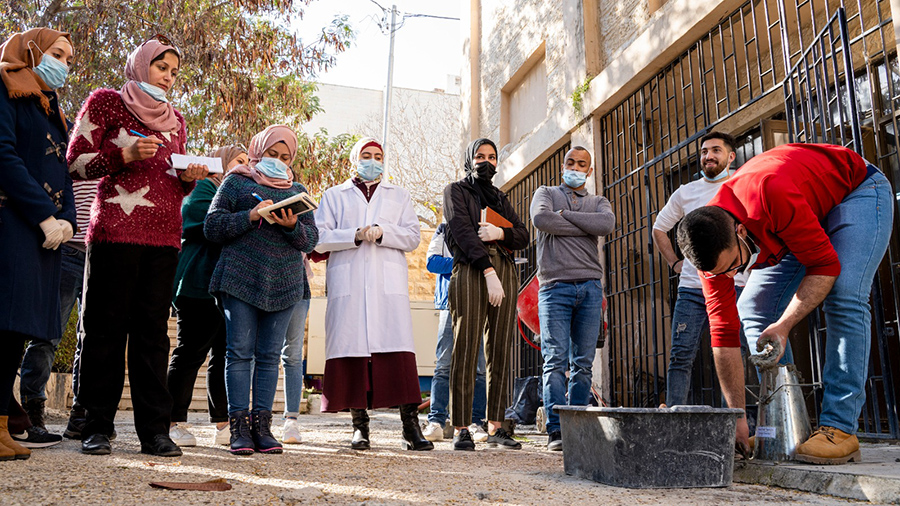Palestine—Finance for Jobs (F4J)
Client: World Bank
Duration: 2016-2028
Region: Middle East and North Africa
Country: Palestine
Solutions: Economic Growth
Palestine needs more sustainable and productive employment opportunities to accommodate the state’s growing population. Creating jobs would reduce poverty and improve quality of life, but many companies have been cut off from direct market contact and cannot find financing, limiting their ability to compete, grow, and add jobs. In addition, Palestine’s unstable business environment with substantial market failures and risks has deterred private investment as a result of the long-standing political turmoil imposing restrictions on access to markets, movement of goods and people, and lack of control over resources.
Implemented on behalf of the Palestinian Ministry of Finance (MOF), the Finance for Jobs project (F4J) series of projects address constraints to job growth in the West Bank and Gaza by developing innovative financing instruments to promote business investment and job creation.

Sample Activities
- Design, test, and implement three innovative financial instruments.
- Solicit proposals from early-stage investment funds for business development services for Palestinian startups.
- With partner Social Finance, build and design a development impact bond (DIB), which relies on results to address the skills gap between labor supply and demand to improve employment opportunities in Palestine.
- Develop a comprehensive model that captures the social and economic cost-benefit to assess the social, environmental, and economic impact of private investments that justify the rationale for public financial support to these investments that otherwise would not have the capacity to proceed.
Select Results
- Entrepreneurship Ecosystem Matching Grant (EE-MG): The EE-MG was designed to target early stage investment funds, seeking investment in growth capital and post-acceleration stage enterprises. F4J has provided wholesale funding to investment funds at a cost-sharing matching grant ratio of 0.7:0.3 which allowed investment funds to invest in business development services to develop pipelines of investible enterprises. Nearly 50 startups benefited from EE-MG with a $8.44 million private capital mobilization and more than 200 jobs created.
- Investment Co-Financing Facility (ICF): This risk-sharing grant mechanism provides commercially sound, job-creating, private sector investments that may otherwise not be considered viable due to market and institutional failures and other Fragile Conflict Violent (FCV) risk considerations. The ICF helped launch a solar-powered industrial park in Gaza and is currently committed to support another 11 job-creating private sector projects across several economic sectors, such as light manufacturing, agribusiness or food processing, green businesses, agriculture, and ICT (fiberoptic networks and microwave links). ICF mobilized approximately $61.7 million private capital and created about 1,501 jobs, of which about 193 jobs went to women.
- Development Impact Bond (DIB): This marks the first World Bank DIB to be implemented worldwide, it is the first Palestinian Employment Development Impact Bond (DIB) that catalyzes the role of the private sector by crowding in both private sector capital and expertise to better incentivize employment outcomes. This bond addresses unemployment through the skills development of 1,250 graduates to improve their employability. By the end of 2023, with DIB payments of $6.25 million, DIB exceeded expected targets, as 1,380 young people were accepted into the program of which 653 are women. More than 1080 young people completed training, of whom 550 were women. More than 655 young people started employment, of whom 270 were women.
- Upon successful completion of the first DIB, a second one is being designed to target a cohort of 1,250 mostly young beneficiaries, of which 400 are expected to have sustained jobs.
- So far, F4J has created 291 jobs held by women out of about 2,033 jobs created, providing them with greater opportunities for economic independence and contributing to sustainable economic growth in the communities we serve.
Featured Links
RELATED CONTENT:
Regional—AL-INVEST Next Programme Management Unit and EU-LAC Trade and Investment
The AL-INVEST Next Programme and its EU-LAC Trade and Investment Component promote a more dynamic and sustainable economic relationship between the EU and the countries of Latin America and the Caribbean.
Read More